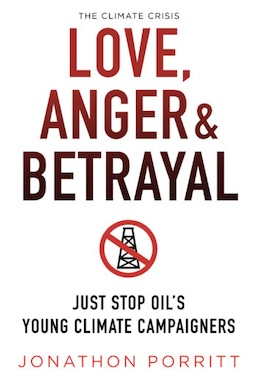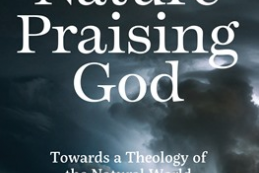Jonathon Porrit: Love, Anger & Betrayal

Jonathon Porrit's latest book, Love, Anger & Betrayal (Anthony Eyre, Mount House Press, 2025) is a game of two halves. On the one hand it is the author's own testimony to the depth of the climate crisis which is already upon us, outlining the multiplicity of issues now coming to a head - taking us into the land of tipping-points, feedback loops and human chicanery (including the'political capture' achieved by 'the Fossil-Fuel Incumbency'). On the other hand it is an attempt to give a voice to Just Stop Oil's Young Climate Campaigners (to quote the book's subtitle).
Porritt lays out with an authority born of a lifetime's involvement in environmental advocacy and campaigning - as variously co-chair of the Green Party, Director of Friends of The Earth, Chair of the Sustainable Development Commission and co-founder of Forum For The Future - the current state of the earth. However, if his first book, Seeing Green, offered a positive invitation to change our relationship with the natural world, this one has more the nature of a dire warning - his emotional investment expressed in the title: Love, Anger & Betrayal. As he acknowledges on the first page, 'it's not remotely objective', despite the scientific basis for his argument. 'The anger,' he says, 'is mostly mine.' And his own anger is addressed in large measure to the 'toxic positivity' (p.33) of the mainstream environmental movement, to the technocrats and intergovernmental agencies, to the charade of climate change negotiations and to the political leaders who are failing to act in any commensurate way in the face of forces which could in a fairly short time-frame lead to a catastrophic collapse not only of the insurance industry (p.2) which gives stability and confidence to financial markets but of the very structures of society, with perhaps two billion deaths by 2050 (p.44).
Rather than lauding the efforts of activists to underline the crisis, the established order cracks down on them with increasingly draconian laws (and increasingly draconian sentencing policies). Porritt warns that we are sliding inexorably into a police state, with the right to peaceful protest being constantly chipped away at by the UK government. He is particularly scathing in his commentary on the current Labour regime: 'Keir Starmer himself doesn't have climate-friendly bone in his body,' to quote one particularly pithy example (p.97). It is the mixture of inaction and cynical repression which he see as the great Betrayal. Perhaps the cynicism has 'worked' to some extent, given that Just Stop Oil 'decided to hang up the high-viz. in April 2025' (p.27), its members moving on to new, yet-to-be-defined but less confrontational forms of Non-Violent Direct Action (NVDA). Whatever the short-term 'success' of the policing and prosecutorial tactics, the growing question of intergenerational injustice is there for those willing to see it: 'Today's younger generation finds itself doing a lot of the heavy lifting to secure a still liveable future not just for themselves, but for their parents and grandparents.' (p.11)
However, the emotionally charged responses in the book are not simply his own. Rather they are the feelings that emerge from the testimonies of 26 Just Stop Oil activists, 'both free and in prison', whom he credits as his co-authors and whom he clearly admires deeply. Principal among their feelings, on Porritt's account, is - perhaps surprisingly - love: love for all those already impacted by the crisis - 'killed, injured, displaced, impoverished, impaired in health, both physically and mentally' and love for all those on whom the impact will be even greater in the future. 'Compassion lies at the heart of their civil resistance.' (p.5)
Notable to any religiously minded reader is the virtual absence of the word 'God' in the book - although the original working-title of the book was. For The Love Of God Pay Attention! Nor do the Just Stop Oil activists reach readily for religious justifications of their stance. They do not see themselves as brave, as beacons of hope or some kind of 'latter-day martyrs'; nor as eco-zealots (p.3). They are uncomfortable with the language of 'sacrifice', too. (p.41) They simply see themselves as having little choice, despite the heavy personal cost of their actions - including imprisonment, impoverishment, family pressures and interrupted careers.
Nonetheless, it is hard not to find echoes in the environmental movement's 'Radical Flank' of the early Christian Church: high levels of commitment, rather an intense sense of community and mutual support, a shared eschatologically-charged vision - although the vision here is more of imminent destruction than of the dawning of the messianic age. They see themselves caught up in a struggle between darkness (exemplified by the Fossil Fuel sector and its apologists) and light: 'I don't use the word lightly, but so many of the decisions being made today are evil,' in the view of one previously imprisoned activist, Phoebe (p.92). Emmeline Pankhurst (herself not averse to using violence in the Suffragette cause) and Martin Luther King are quoted as exemplars. 'Neither Pankhurst nor King, nor the movements they led, were there to be liked … Just Stop Oil was not there to be liked either.' (p.35)
In fact, in their interviews and testimonies, the 26 activists interviewed by Porritt are as likely to view their friends as their 'inspiration' as any famous historical figure - peers who have given witness and support to form them and help them to resist in the face of whatever forces are unleashed against them. Perhaps the most powerful reason for reading this book is in order to hear their voices, their passion and compassion. While the activists might resist idealisation (much as does Greta Thunberg in her interviews) and while some will be more 'together' than others - especially in the wake of prosecution and imprisonment - they are martyrs in the original sense of the word, witnesses who give testimony to the truth as they understand it. And they are to some degree prophets - conveyors of inconvenient truths to their host culture.
Is there hope in this book? Porritt expresses early on the hope that we might yet wake up to the threats that we collectively face - threats which do not respect national borders or levels of education or social class. Yet he ultimately concludes that it is an 'irrational hopefulness' (p.265). And he quotes Nick Cave: 'Hopefulness is … adversarial. It is the warrior emotion that can lay waste to cynicism. Working with this particular group of young 'warriors' has been extraordinarily re-energising. No cynicism here!' (p.258)
We need to hear the voices of hope in these 'Radical Flank'-ers. We also need to listen compassionately to the voices of despair, such as that of Anna: 'I'm 22 now, and I already know that I won't have children - I wouldn't bring children into this world. So, at 22, and knowing that this part of my life is already over, is one of the worst feelings … I still imagine a future where I have children, and a house, and a family. And then I'm reminded, every time I look at the news, … that those children that I imagine I would love so deeply, I'll never know them. They'll never know me.' (p.236) I pray that she's proved wrong one day.
Read this book. Listen. Learn. Pray.
Canon Rob Esdaile is parish priest of Woking & Knaphill Catholic Community in Surrey
LINK
Love, Anger & Betrayal: https://anthonyeyre.com/product/love-anger-betrayal/


















